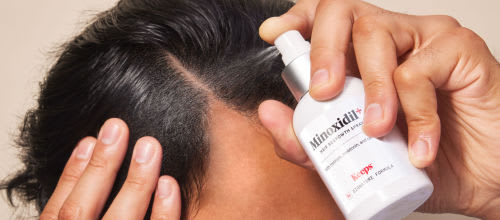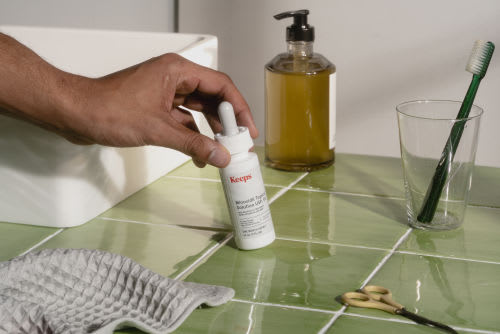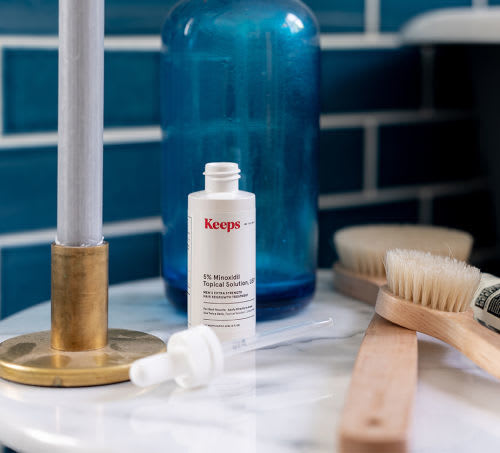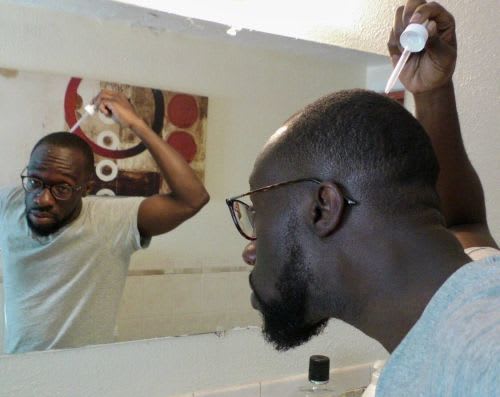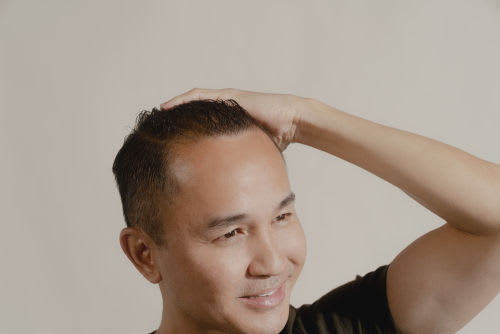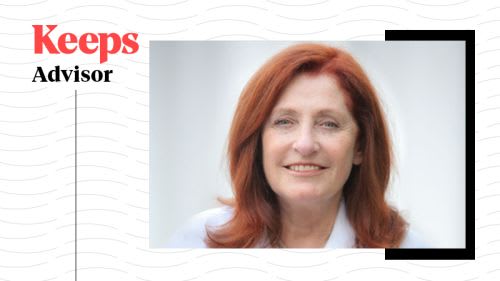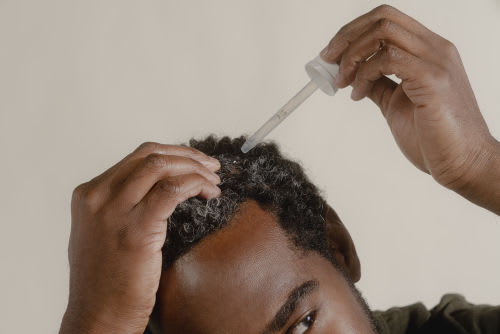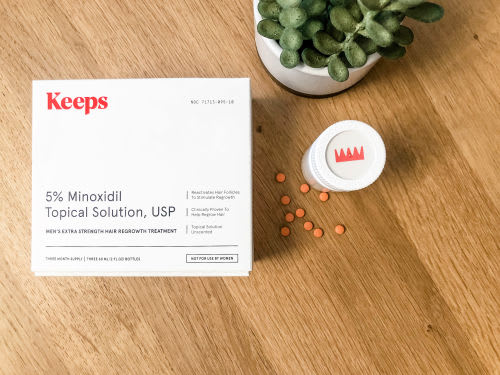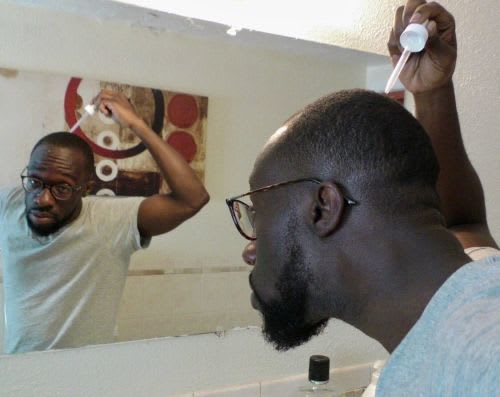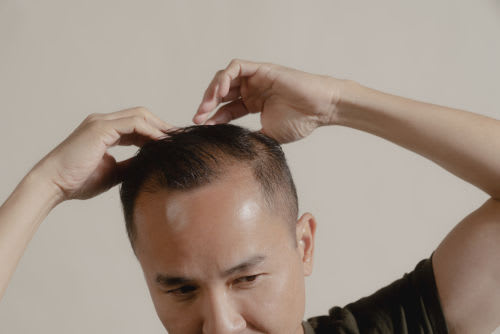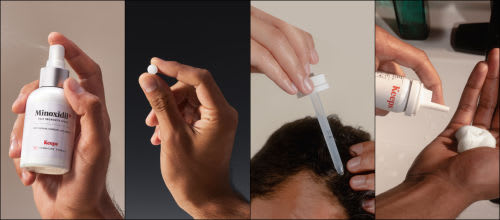Learn more about the causes of hair loss
and what you can do to prevent it.
What Does COVID-19 Have to Do With Hair Loss?
Heard that hair loss might be a symptom of COVID-19? Before you start worrying, get the facts about how coronavirus and hair loss are related.
What’s the Difference Between Pomade and Hair Gel?
Hair gel and pomade may seem similar but did you know one of these works better for thinning hair? We're breaking down the pros and cons of both for you.
Keeps Minoxidil+ Hair Regrowth Spray: Uses, Side Effects, and More
Trying to find the best way to address your hair loss? Meet Minoxidil+ Hair Regrowth Spray: Keeps’ FIRST ever 4-in-1 topical spray, made with a combo of minoxidil and other clinically-backed ingredients.
Finasteride vs. Minoxidil: What’s Right for Me?
Finasteride and minoxidil are two FDA-approved solutions to treat male pattern baldness. Find out how each one works, how they differ, and which one you should use.
What Are DHT Blockers and How Do They Prevent Hair Loss?
DHT, or dihydrotestosterone, is the male sex hormone responsible for male pattern baldness. Find out how DHT blockers like finasteride can stop hair loss.
Before & After: 5 Real Guys Review Keeps
“Guess what? It worked. I went from having numerous bald spots to having a full head of hair again.”
How to Buy Finasteride for Hair Loss
Find out how finasteride (best known by its trade names, Propecia and Proscar) combats male pattern baldness, stops hair loss, and promotes hair growth.
How to Tame a Cowlick with Pomade
We all know how frustrating cowlicks can be, so here are some tips to help you fix them.
What Causes Hair Loss?
From genetics to diet to stress to medical conditions and more, the causes of permanent and temporary hair loss are as diverse as the heads they affect.
11 Myths About Hair Loss Debunked
From shampoo to hats to masturbation and beyond, there are about as many myths around the cause of male pattern baldness as there are hairs in your hair.
Can I Stop Hair Loss?
Wondering how to stop hair loss before it goes any further? While there's no cure for male pattern baldness, minoxidil and finasteride provide two very safe and effective ways to help prevent further hair loss.
What Are the Signs of Hair Loss?
Are you experiencing male pattern baldness? These signs may indicate that you’re experiencing hair loss.
Why Is My Hair Falling Out?
Wondering why your hair is falling out? The root cause is likely genetics, but it could also be due to stress, medical conditions, and more. Discover some of the top reasons for hair loss.
Do Hats Cause Hair Loss?
Do hats cause hair loss? Find out why your baseball cap isn’t to blame — plus some handy tips to keep your hat-wearing head happy.
How to Buy Minoxidil for Hair Loss
Find out how minoxidil (best known by its trade name, Rogaine) combats male pattern baldness, stops hair loss, and promotes hair growth.
Does Masturbation Cause Hair Loss?
Masturbation is one of the great myths of hair loss. Find out why masturbating in no way exacerbates male pattern baldness.
Does Stress Cause Hair Loss?
Stress can lead to temporary hair loss. Find out how alopecia areata, telogen effluvium, and trichotillomania can be brought on by elevated levels of anxiety.
How Long Before Minoxidil Starts Working?
Minoxidil helps stop hair loss and grow new hair. If you apply it twice daily, you typically will see an improvement in hair loss as early as four to six months.
How Long Before Finasteride Starts Working?
Finasteride helps stop hair loss and grow new hair. If you take it daily, you could start to see an improvement in hair loss as early as four to six months.
How Do You Take Finasteride?
Finasteride is an oral tablet that, when taken once daily, can prevent and treat male pattern baldness. Find out how to use this revolutionary medicine.
Are Hair Loss Treatments Effective?
There are lots of solutions claiming to cure hair loss, but there are only two FDA-approved treatments that are proven to be effective: minoxidil and finasteride.
How to Use Your Finasteride
Finasteride is an FDA-approved prescription tablet that has been clinically proven to prevent the spread of receding hairlines and boost hair regrowth. Watch our tips for maximizing effectiveness of this medication.
What Are the Side Effects of Finasteride?
Curious about finasteride side effects? Learn more from Dr. Jerry Shapiro, world-renowned hair loss expert on potential side effects.
How Does Minoxidil Work?
Minoxidil is a topical solution that you apply to the scalp twice daily to treat hair loss. Minoxidil helps regrow hair by stimulating the hair follicle to grow. Learn more from Dr. Jerry Shapiro, world-renowned hair loss expert.
How Does Finasteride Work?
Finasteride is an FDA-approved prescription tablet used to treat male pattern baldness in men only. Learn more from Dr. Jerry Shapiro, world-renowned hair loss expert on potential side effects.
Is Summer Hair Loss a Real Thing?
Do we lose more hair in the summer? Do hats or sunshine cause hair loss? Allow us to debunk common myths, so you can go back to enjoying the weather.
What Happens if I Stop Taking Finasteride?
Finasteride is a prescription medication clinically proven to prevent male pattern baldness. But what happens if you stop taking finasteride?
Does Losing Hair Every Day Mean I'm Going Bald?
Is it normal to shed hair every day? Find out how to identify the real signs of hair loss and how you can take action to prevent it.
Everything You Need to Know for National Hair Loss Awareness Month
Everything you need to know (and then some) about National Hair Loss Awareness Month.
What Role Do Genetics Play in Hair Loss?
You’ve probably heard that if your mom’s side of the family suffers from hair loss, you will too. Well, that’s only half true.
4 Easy Ways to Remember to Take Your Hair Loss Treatment
Struggling to remember to take your finasteride every day? How about applying your minoxidil? Building new habits is hard. These tips make it easier.
Meet a Keeps Advisor: Dr. Antonella Tosti
One of the first thoughts you’ll have after reading about Dr. Anontella Tosti’s background is, “but when did she sleep?”
Meet a Keeps Advisor: Dr. Jerry Shapiro
“Will I ever get my hair back?” is the most common question Dr. Jerry Shapiro hears from his patients.
Watch Real Before & After Videos from Keeps Customers
We’re not just telling you that Keeps hair loss treatments can work, but showing you a few real life before-and-after videos from our customers.
Fact or Fiction: Do Hair Loss Shampoos Work to Stop Hair Loss?
If you want to stop hair loss, you have to block DHT. And on your search for DHT blockers, you may’ve come across hair loss shampoo that can supposedly stop hair loss. We wanted to know, does they actually work?
Tell Me More: What's the Difference Between Finasteride 1mg and Finasteride 5mg?
More is better, right? Well, that's not always the case, especially when it comes to finasteride.
8 Research-Backed Remedies for Stronger, Healthier Hair
Nope, they won't stop your hair loss — but they will help the hair you have look healthier and fuller.
6 Hair Styling Tips for Guys Using Minoxidil
Using minoxidil (generic Rogaine®) to treat your hair loss? Hair loss expert Antonella Tosti shared five simple hair styling tips to keep in mind while using the product.
Tell Me More: How to Know if Your Thyroid's Causing Your Hair Loss
Losing your hair can be a symptom of many things. And, often, when people start to notice, they wonder if there’s something wrong with their thyroid.
This Is How PRP Works to Stop Hair Loss
Here's everything you need to know about PRP (platelet-rich plasma) and how it works to stop hair loss.
A Beginner's Guide to Beard Care
New to having a beard? We made a list of everything you need to know to make it look awesome.
Everything You Should Know About Ketoconazole Shampoo
Here's everything you need to know about using ketoconazole shampoo to treat an itchy scalp or dandruff.
Every Question You Have About Dandruff (But Don't Want to Ask)
Here's everything you need to know about what causes dandruff, what the symptoms are (hello itchy scalp) and how to treat it effectively.
How to Use Minoxidil Foam
Wondering how to apply minoxidil foam? Read our tips to get the best results from this hair loss treatment.
5 Keeps Customers Talk Results After 3 Months
Wondering what to expect in your first few months of using Keeps? Five guys share when they started seeing results.
Why Does Hair Change Color When it Grows Back?
Thrilled about the new hair growth you're getting from minoxidil or finasteride—but not the new hair color? Dr. Antonella Tosti explains why hair loss treatments can make your hair look darker (and why you shouldn't worry about it!).
6-Month Check-in: 5 Keeps Customers Tell Us How They're Doing
Hair loss doesn't stop overnight. As these guys will tell you, sometimes you have to wait a few months to find out what a difference Keeps treatment can make.
5 Real Customers on What You Can Expect from Keeps Treatment
Five guys describe the results they got from Keeps. (Spoiler: They stopped losing their hair.)
How to Use Minoxidil Solution
Minoxidil is very easy to apply. Read this to find out how to put the topical solution onto your scalp to prevent male pattern baldness.
All the Different Parts of Your Head, Explained
We're breaking down the different parts of the head so you can describe your hair loss the same way the experts do.
The Interesting Hair Loss Research You Should Know About
Read this for all the latest breakthroughs in the world of hair loss research, including lasers, stem cells, and 3D printing (seriously).
This Is How Hair Transplants Actually Work
Wondering how hair transplants actually work, and if they’re a good option for treating your hair loss? Wonder no more. We’ve got all the answers you need.
Watch all the Best Keeps Commercials
We don't normally like to pat ourselves on the back, but these are worth watching again and again.
Here's the Right Way to Grow Your Beard
Thinking about shaking up your look with a new beard? Here's everything you need to know before you throw away your razor.
How to Start Growing Your Hair Back After Chemotherapy
After chemotherapy, it's understandable to want your hair to grow back as quickly as possible. Here's how to give your hair the help it needs to come back strong and healthy.
What Are the Different Types of Alopecia?
Most men start digging into alopecia causes when they first notice hair loss. But before you go too far down that rabbit hole, learn about the different types.
Here’s the Truth About Post-Finasteride Syndrome
Worried about the long-term effects of using finasteride? Let's break down the facts about post-finasteride syndrome.
What Are the 4 Stages of Hair Growth?
Learn more about the four stages of hair growth so you can figure out if your hair loss is happening at a normal rate or if it's time to find treatment.
Are Natural DHT Blockers like Green Tea and Caffeine Effective?
Plenty of natural remedies are promoted online as medication-free DHT blockers, but do any of them actually work? We'll tell you what the studies say.
Yes, It's Normal to Lose More Hair When You Start Minoxidil
Nothing's more frustrating than starting a hair loss treatment only to see even more of your hair falling out. But there's a good reason to stick it out—initial shedding is actually a sign that minoxidil's working.
What the Finasteride Plus Recall Means for You
A limited number of finasteride plus bottles have been recalled by the FDA. Here's what you need to know about what's going on.
What to Know Before You Buy a Hair Loss Concealer
Ever considered buying a product that covers up bald spots? Here's everything you ought to know about these powders, sprays, and fibers.
How To Identify and Maintain Different Types of Men's Hair
You may think you know everything you need to about your hair type, but if you don't know what "3C" means, you might not.
What to Know About Saw Palmetto and Your Hair's Health
Research suggests that saw palmetto really can boost hair health—but does it work as well as some guys claim? Here's what the evidence says.
How Green Tea Helps Keep Your Hair Healthy
You've probably heard that green tea has health benefits, but did you know it's good for your hair? Here's what you should know about how green tea can help your hair.
Does Biotin Really Help Your Hair Stay Healthy?
Wondering how much of biotin's reputation as a miracle hair health booster is actually deserved? We did the research to help you separate fact from fiction.
Can Caffeine Jump Start Hair Health?
That cup of coffee you're holding could be doing more than just helping you stay awake. Here's the science behind the relationship between caffeine and hair health.
What You Should Know About Thickening Conditioner
Your conditioner can really make an impact on how your hair looks. Here are the basics of what you need to know.
What You Should Know About Thickening Shampoo
Wondering if thickening shampoo is worth your money? Here's what you should know before you reach for your wallet.
Yes, Natural Shampoos and Conditioners Do Make a Difference
"Natural" means more than just eco-friendly packaging. Here's how natural shampoos and conditioners can make a difference in your hair.
Meet a Keeps Advisor: Dr. Raman Madan
Get to know the hair loss expert who works with the New York Mets and the New York Yankees.
The 11 Types of Shampoo (Plus, When to Use Each One)
Yep, there really are that many different kinds of shampoo. Here's how to know which ones you should be shopping for.
Here's What You Should Know About Men's Hair Conditioners
Ever found yourself stumped in the conditioner aisle? Read this to find out what you should pick up next time.
The Science Behind Ketoconazole Shampoo and Hair Loss
Did you know that many experts recommend ketoconazole shampoo for hair loss? See the clinical evidence that says medicated shampoo really can help.
How to Read the Label on a Shampoo Bottle (and Actually Understand It)
Can't wrap your head around terms like "sodium lauryl sulfate" and "paraben?" Here's what the words on shampoo labels actually mean.
Yes, Laser Helmets Are a Real Hair Loss Treatment
It's not science fiction—lasers really can help treat your hair loss, but not so well that you should pin all your hopes on them.
Here's the Real Deal With Scalp Tattoos
Scalp tattoos can be a safe and effective way to conceal hair loss, but they won't treat the root cause (pun definitely intended).
Can Dermarolling Help With Hair Loss? We Did the Research for You
Ever considered using hundreds of tiny needles to treat your hair loss? Microneedling can boost regrowth, but it comes with some risks.
6 Common Hair Issues You May Have in Addition to Balding
Whether it's rashes, bumps, or flakes, if uninvited guests have made their home on your scalp, we can help you figure out what to do about it.
I’m Losing My Hair. Does that Mean I Have to Change My Hairstyle?
Curious if your locs or man bun are impacting your hair loss treatment? Find out if you should reconsider your hairstyle to make the most out of your treatment.
Haircut Tips for Men With Thinning Hair
Going to the barber can be intimidating when you're not confident about your hair. These pro tips will make sure your next cut leaves you feeling great.
Benefits of Castor Oil & Hair
Castor oil is well-known for its plethora of benefits. But is there scientific evidence that castor oil supports hair growth?
What’s the Relationship Between Testosterone and Hair Loss?
Ever hear that high testosterone causes guys to go bald? That's just a myth (sorry!), but the truth is a lot more interesting.
4 Myths about Sunscreen and Hair Loss
Wondering whether or not you should skip the sunscreen? This article debunks any myths you might have heard about sunscreen and hair loss.
How Topical Finasteride Works
From how it works to the benefits and potential side effects, here’s everything you need to know about topical finasteride.
Everything You Need to Know About Compounded Hair Loss Treatments
Have you ever considered a two-in-one topical finasteride and minoxidil formula to treat hair loss? Here’s everything you need to know about this compounded hair loss treatment.
Which Hair Restoration Option is Right For Me?
From FUE to stem cells, learn about all the different hair restoration options and which one might be best for you.
What is Pomade: How to Style, Thickening Benefits, and More
From the pompadour to the faux hawk, most great hairstyles begin with pomade. Here’s everything you need to know about this versatile styling product.
Everything You Need to Know about Hair Transplant Recovery
Considering a hair transplant but worried about the recovery process? Well, it's a lot easier than you'd expect — let's break it down for you.
What Is Follicular Unit Excision (and How Does it Even Work?)
If you've looked into hair restoration, you've probably come across Follicular Unit Excision or FUE transplants. Learn why doctors recommend this virtually painless procedure for anyone looking for a long-term hair loss treatment.
Are Hair Transplants Worth It? Let’s Break Down The Pros and Cons
We broke down what exactly a hair transplant entails and how much a hair transplant costs, so you can determine if the price is worth it for you.
How to Apply Topical Finasteride
Want to use topical finasteride to treat hair loss? Luckily, it's easy to apply and make part of your routine. Here's how.
How Much Do Hair Transplants Cost?
Interested in a hair transplant? Here’s what you should know about the cost and value of hair restoration.
How Long Do FUE Hair Transplants Last?
Learn more about FUE hair transplants as a permanent solution for hair loss.
5 Things to Know About PRP Hair Injections
Have questions about platelet rich plasma injections? Learn more about PRP hair injections from the hair loss experts at Keeps.
Types of Minoxidil for Hair Loss: Minoxidil Spray, Oral Minoxidil, Minoxidil Solution, and Minoxidil Foam
Learn about the different types of minoxidil for hair loss.
The Ultimate Guide to ED (Erectile Dysfunction)
Erectile dysfunction (ED): it’s actually more common than you think – and therefore worthy of a bigger discussion. Even better: It’s treatable when you look at the bigger picture of what’s going on down there.
The Ultimate Guide to PE (Premature Ejaculation)
If you or your partner are experiencing premature ejaculation, you may feel alone in your feelings of frustration. But here’s the thing: It’s actually pretty common – perhaps even the most common sexual dysfunction among men.


